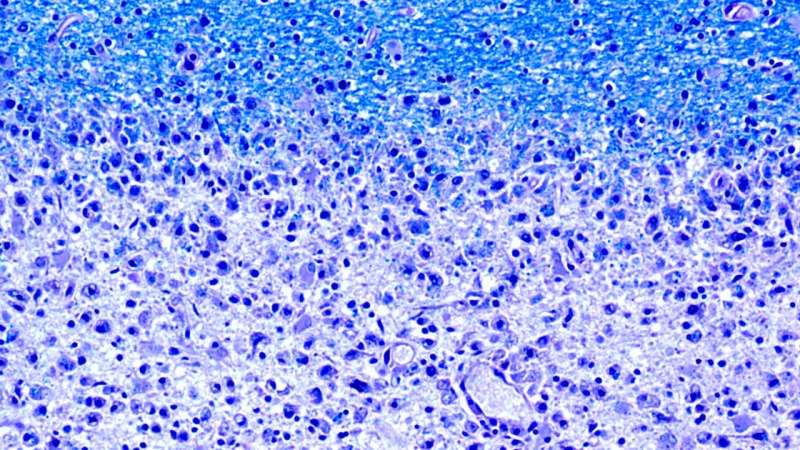October 11, 2018 report
Enzyme that triggers autoimmune responses from T-cells in patients with MS found

A team of researchers from Switzerland, the U.S. and Spain has isolated an enzyme that triggers an autoimmune response from T-cells in patients with MS. In their paper published in the journal Science Translational Medicine, the group describes their study of T-cells and protein fragments and what they found. Joseph Sabatino Jr. and Scott Zamvil with the University of California, have written a Focus piece on the work done by the team in the same journal issue.
Multiple sclerosis arises when the immune system begins mistakenly attacking myelin, a lipid-rich insulator that covers nerve endings. People with MS generally develop tingling and numbness, and over time, a host of other symptoms. There is currently no cure, and treatment is limited to attempts to improve functionality. The cause of the disease is not known either, but it is believed that an agent of some sort causes T-cells to attack certain molecules in myelin as foreign invaders. In this new effort, the researchers have found an enzyme that triggers an immune response from T-cells in MS patients. They also found that the same kind of T-cells reacted to a bacterial variant of the enzyme, suggesting that molecular mimics might be involved. The researchers believe the enzyme they have identified could include a molecule that is the self-antigen scientists have been looking for.
A self-antigen, as its name implies, is a molecule that resides in the body but is misidentified by the immune system as an enemy. It has long been thought that the self-antigen involved in MS lies in one of the proteins in myelin. To find it, the researchers collected T-cells from patients who had died from the disease. They then tested 200 fragment mixtures representing 300 billion varieties. The two with the strongest reaction both came from an enzyme called guanosine diphosphate-L-fucose synthase. The researchers report that T-cells from 12 of the 31 samples were found to react to the enzyme. They also found that T-cells from some of the MS patients also reacted to a bacterial version of the same enzyme, suggesting that some types of bacteria may play a role in setting off an MS-related immune response.
More information: Raquel Planas et al. GDP-l-fucose synthase is a CD4+ T cell–specific autoantigen in DRB3*02:02 patients with multiple sclerosis, Science Translational Medicine (2018). DOI: 10.1126/scitranslmed.aat4301
© 2018 Medical Xpress



















